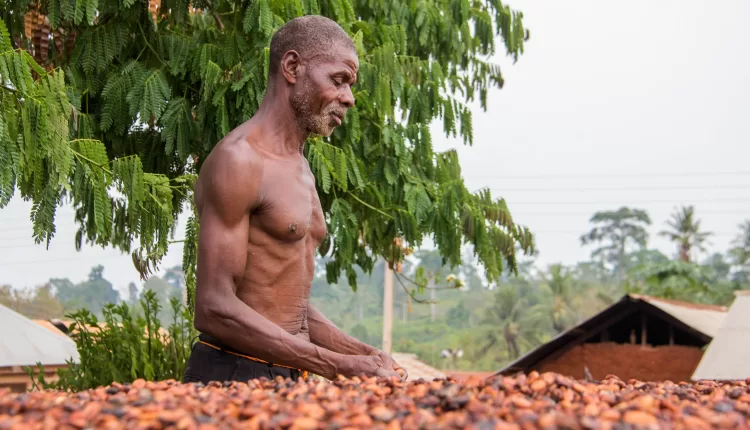In the ever-evolving landscape of cocoa farming, joining farmers’ cooperatives has emerged as a pivotal decision for cocoa farmers seeking sustainable growth, increased profitability, and community development.
These cooperatives, designed to empower and support farmers, offer a host of benefits that can transform the lives of cocoa growers and uplift the entire cocoa industry.
Using Ghana as a case study, let’s now look at five of the many compelling reasons why cocoa farmers must consider joining or forming cooperatives.
1. Resources and Knowledge Sharing:
Farmers’ cooperatives act as knowledge hubs or key points of contact for organisations offering training and education programs as well as agro-input support to cocoa farmers.
For instance, Ghana’s cocoa sector authority – Cocobod – provides free agricultural extension services and subsidised fertiliser and agrochemicals to farmers through their cooperatives.
Civil society groups and NGOs also engage farmers through cooperatives to offer training on sustainability trends as well as help disseminate new policies that may impact farmers.
Again, it is the conduit of farmer cooperatives that companies utilise to provide sustainability support to cocoa growers.
Through these important resources offered through the cooperatives, cocoa farmers gain valuable insights into good agricultural practices, sustainable farming methods, climate-resilient techniques and yield-enhancing innovations.
So, a decision to belong to a farmer cooperative is an important one that empowers farmers with the tools they need to adapt to changing market trends and environmental challenges effectively.
2. Access to Financial Resources and Credit:
Financial institutions in West Africa have traditionally viewed agriculture as high-risk hence the low investments farmers are able to attract for their activities.
Joining a farmers’ cooperative opens up access to financial resources and credit facilities that individual farmers might find challenging to secure independently.
Cooperatives often collaborate with financial institutions, NGOs, and government programmes to provide farmers with affordable loans, grants, and financial advice.
With improved access to credit, cocoa farmers can invest in modern agricultural practices, technology, and inputs to enhance their productivity and profitability.
In recent times, development organisations have leveraged farmer cooperatives to introduce Village Savings and Loans Association (VSLA) schemes, a financial inclusion tool that has proven crucial in empowering farmers to pool resources for individual and community development which hitherto would not have been possible with traditional financial firms.
3. Social and Community Development:
Farmers’ cooperatives play a vital role in fostering social cohesion and community development.
By working together, farmers strengthen their bonds and promote a sense of solidarity in cocoa-growing communities.
Cooperatives often engage in social initiatives, such as building schools, healthcare centres, and infrastructure projects that benefit the entire community.
A classic example is the Asunafo North Cocoa cooperative in Ghana’s Ahafo Region which has been at the forefront of developmental projects in cocoa-producing communities including water projects, school infrastructure, and educational materials.
Additionally, cooperatives may invest in social welfare programmes, mutual health and life insurance schemes to improve the living standards of member farmers and their families.

4. Enhanced Market Opportunities:
Cooperatives streamline the marketing process, eliminating middlemen and reducing distribution costs.
Therefore, collective marketing becomes one of the most significant advantages of being part of any farmers’ cooperative.
By pooling their produce, cocoa farmers’ cooperatives can trade with buyers which offer competitive incentives like sustainability certification, input support and yield enhancement training.
This may also open market access doors to manufacturing companies who seek ethically-sourced and high-quality cocoa, potentially leading to premium prices for cooperative members.
5. Build Capacity for Vertical Development:
By uniting as a collective force, cocoa farmers can invest in capacity building for their vertical development or growth in the cocoa value chain.
From organising for social and knowledge-sharing building purposes, cocoa farmers’ cooperatives can move a notch up the business ladder to becoming licensed buying companies (LBCs) to rake in extra income and opportunities for members.
Nananom Buyers, Cocoa Abrabopa Association and ABOCFA Cooperative Cocoa are all great examples of farmers’ cooperatives emerging as thriving businesses delivering extra value to their shareholders – cocoa farmers.
Others have even gone a step further to establishing industries and high-earning real estate investments.
With this vertical development approach, some of these empowered cooperatives-turned-businesses may have succeeded in weaning their farmers of exploitative practices and creating a more equitable cocoa trade system.
They may now also be able to negotiate fair premiums for sustainable cocoa, ensuring that farmers receive reasonable compensation for their hard work and dedication.
The decision to join a farmers’ cooperative can be a transformative step for cocoa farmers, propelling them towards sustainable success and prosperity.
Through knowledge sharing, access to financial resources, enhanced market opportunities, and an appetite for vertical development, cocoa farmers can overcome challenges and secure a brighter future for themselves and their communities.
As the cocoa industry continues to evolve, farmers’ cooperatives stand as beacons of hope, empowering farmers and fostering a more equitable and resilient cocoa sector.
Having an active voice in the crucial issue of cocoa price determination may be a far cry today, but it is certainly not impossible when cocoa farmers’ cooperatives begin exploring unionisation for a common agenda.
- Illegal Mining Threatening Ghana’s $230M Cocoa Rehabilitation - April 10, 2024
- Ghana Raises Cocoa Farmgate Price by 58.26% to GHC2,070 per bag - April 5, 2024
- New Standard for Measuring Cocoa Household Income Launched - April 5, 2024
